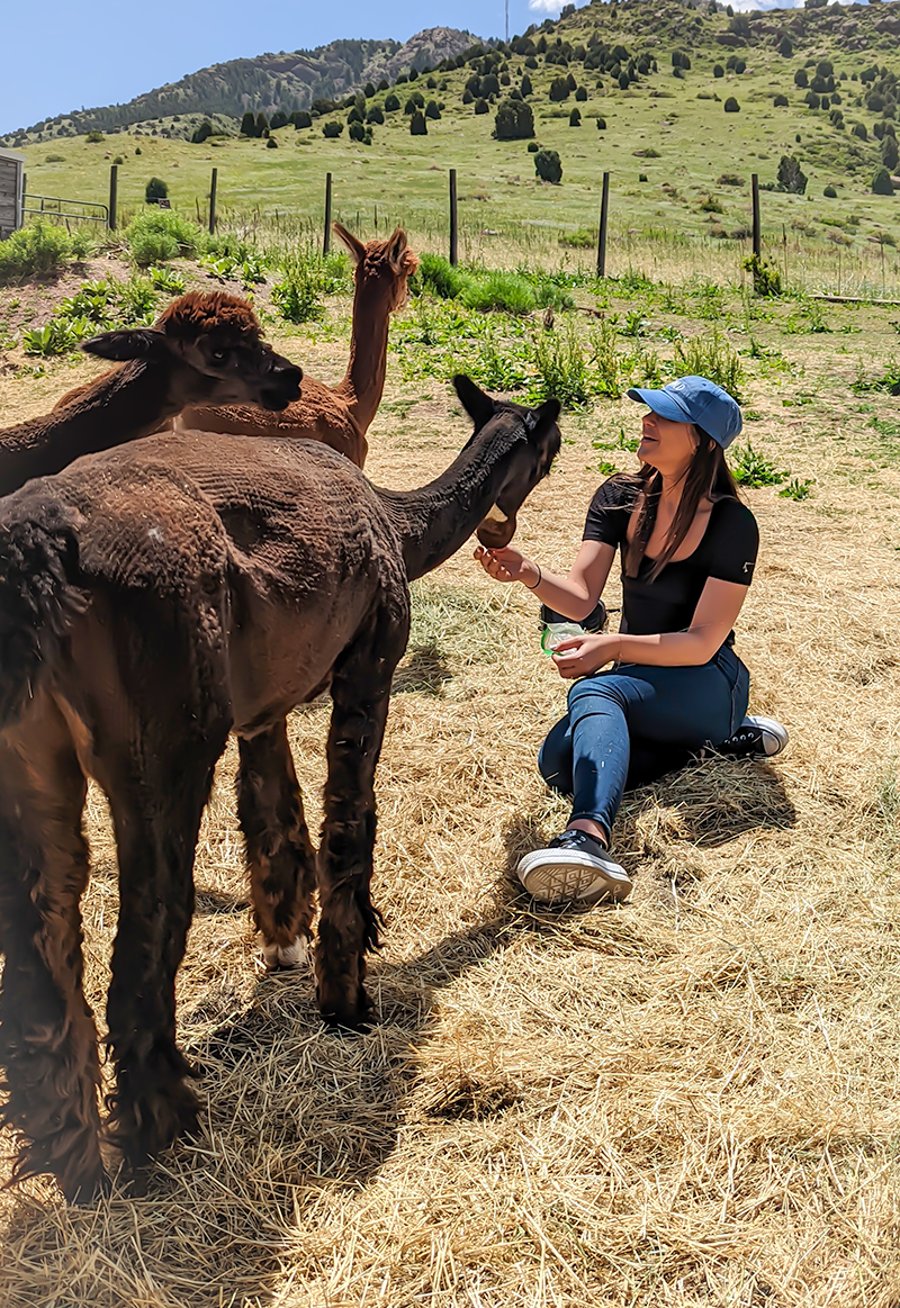Denver, Colorado alpaca adventures with meetalpacas.com: Still, seeing alpacas on a ranch in what many consider to be a big city out West can be a bit mind-boggling. What is life like on the ranch? What does an alpaca eat? Do they run and play with each other? Are alpacas high maintenance and easy to care for? Get all your questions just like this (and more!) answered. Your expert guide will fill you in on what it’s like to live and work on an alpaca farm. It offers views of the gorgeous surrounding areas : Do you want to see Colorado mountain views without needing to hike? Whether you’re traveling with a large group, have small children in tow, or just don’t like hiking, this experience will allow you to take in scenic mountain views in a unique way. Are you looking for an educational opportunity for your kids? Come enjoy an alpaca experience that’s not only fun but also informative. This alpaca experience takes place on a fiber farm. This type of farm raises animals like alpacas, sheep, goats, llamas, angora rabbits, and more for their fleece and wool. Find extra information at alpaca experiences in Colorado.
Alpaca fur is a very prized fiber for artisans and crafters. Alpaca fur is very soft and does not retain water. It is also very durable. According to National Geographic, alpaca fur is the second strongest animal fiber, after mohair. Alpacas come in 22 colors, from a true, blue-black through browns and tans to white, according to Alpaca Ventures. Some Andean people eat alpaca meat. In Peru, it is often served in upscale restaurants. Alpacas don’t have teeth in the top-front of their mouths. This gives them the appearance of having an underbite.
Are alpacas easy to care for? Alpacas are a small and relatively easy livestock to maintain. They stand about 36′ high at the withers (where the neck and spine come together) and weigh between 120 to 200 pounds. Like other types of livestock, alpacas need basic shelter and protection from heat and foul weather. Good nutrition is essential for healthy animals. Hay, minerals, and fresh clean water should be available at all times. Many alpaca owners also provide a nutritional supplement. Under a veterinarian’s direction, alpacas need vaccinations, preventive medication, and deworming. Alpacas also require yearly shearing to keep them cool in the summer. Alpacas do not have hooves; instead they have two toes, with hard toenails on top and a soft pad on the bottom of their feet. Their padded feet minimize the impact on the pasture. To ensure proper foot alignment and comfort, their toenails must be trimmed as needed.
Alpacas are very social creatures. They are gentle and curious and with training can become great pets, according to Switzer. Herds often include animals of different species or taxonomic families, such as llamas, goats and sheep, according to the FAO. Alpacas spit when they are distressed or feel threatened. They will sometimes spit at each other when they are competing for food or trying to establish dominance, according to Switzer. They won’t spit at people or bite unless they have been abused.
Do alpacas make noise? Alpacas are very quiet, docile animals that make a minimal amount of sound. They do make a humming sound as a means of communication or to express concern or stress. Most communication between alpacas is nonverbal. Occasionally you will hear a shrill “alarm call,” which usually means they have spotted something of concern nearby, and they are warning others in the herd. The concern may be a predator, or may be something they are not familiar with, like a cow or horse in a neighboring field. Male alpacas also “serenade” females during breeding with a guttural, throaty sound called “orgling.”
Still, you should always remember to treat alpacas with space and respect. Alpacas don’t like being grabbed or held, and they are often particularly sensitive to being touched on the head. Instead, allow them to approach you at their own pace. This often results in a much more rewarding and affectionate response. If you’re looking for an age-appropriate experience for the entire family, you’ve met your match. Interacting with alpacas is safe for everyone from little kids to elderly members of your crew. There are no age restrictions — kids 2 and under are free. See extra info on meetalpacas.com.
What do I need by way of shelter and fencing? Shelter requirements vary depending on the weather and predators in the area. As a rule, alpacas need at least a three-sided open shelter where they can escape from the heat of the sun in summer and from icy wind and snow in winter. Alpacas appreciate good ventilation, and owners have found that large overhangs outside of the shelter are used more often than an enclosed barn. In general, fencing construction and design is dictated by the threat of local predators. Also, fence openings need to be the correct size for alpacas to prevent injury from entangling their neck and limbs.
